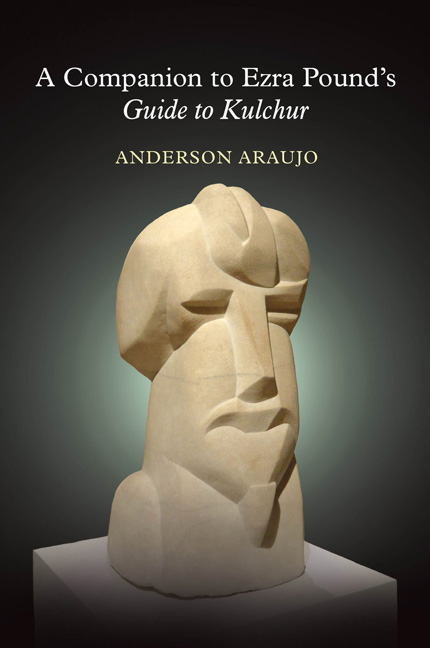Book contents
- Frontmatter
- Contents
- Acknowledgments
- Abbreviations
- Introduction
- Guide to Kulchur
- Part I
- Section I
- Section II
- Part II
- Section III
- Section IV
- Part III
- Section V
- 15 Values
- 16 Europe Or The Setting
- 17 Sophists
- 18 Kulchur: Part One
- 19 Kulchur: Part Two
- 20 March 12th
- 21 Textbooks
- Section VI
- Part IV
- Section VII
- Section VIII
- Section IV
- Part V
- Section X
- Section XI
- Part VI
- Section XII
- Section XIII
- Addenda: 1952
- Notes
- Index
19 - Kulchur: Part Two
from Section V
- Frontmatter
- Contents
- Acknowledgments
- Abbreviations
- Introduction
- Guide to Kulchur
- Part I
- Section I
- Section II
- Part II
- Section III
- Section IV
- Part III
- Section V
- 15 Values
- 16 Europe Or The Setting
- 17 Sophists
- 18 Kulchur: Part One
- 19 Kulchur: Part Two
- 20 March 12th
- 21 Textbooks
- Section VI
- Part IV
- Section VII
- Section VIII
- Section IV
- Part V
- Section X
- Section XI
- Part VI
- Section XII
- Section XIII
- Addenda: 1952
- Notes
- Index
Summary
Mr Maeterlinck's The Bee: In 1901, Belgian Symbolist dramatist, poet, and essayist Maurice Maeterlinck (1862–1949) published La vie des abeilles (The Life of the Bee), an impressionistic history of beekeeping and “all that can with any certainty be known of the curious, profound, and intimate side” of the industrious insect. He was awarded the Nobel Prize for Literature in 1911.
Gourmont's method: Remy de Gourmont's The Natural Philosophy of Love (1904), which Pound translated in 1922, contains a chapter on “love among social animals,” which describes the social and reproductive organization of bees. Gourmont characterizes the typical hive as a “sort of matriarchate” centered around the queen bee, whose “wedding” and copulation concludes with an “explosion” that kills the male drone. Gourmont also cites Maeterlinck's study of bees.
“gli uomini vivono in pochi”: (It.) “Humanity lives in a few.” Pound uses the full Italian maxim as an epigraph to his Gaudier-Brzeska: A Memoir (1916), attributing the authorship to Machiavelli: “Gli uomini vivono in pochi e gli altri son pecorelle” (“Humanity lives in a few, and the rest are sheep”) (cf. note GK 266).
Dr C.: Unidentified.
R. L. S.: Robert Louis Stevenson (1850–94), Scottish novelist, essayist, poet, and author of the adventure novel Treasure Island (1883) and the Gothic novella The Strange Case of Dr Jekyll and Mr Hyde (1886), among many other works. Henry James, a close friend, refers to Stevenson in a magazine article of 1888 as a “bright particular genius.”3 Stevenson left Scotland for the United States in 1879 and worked as a journalist in California. In 1887, even after he had become a famous author, Stevenson still desperately sought to receive royalties from American editions of his work.
G. Rogers … was on the Inquirer when I met him: The Kingston Daily Freeman of October 4, 1907 cites George Rogers as an editor at The Philadelphia Inquirer. Pound would have met Rogers in his Philadelphia days. It is unclear whether the British novelist and poet Rudyard Kipling (1865–1936) ever sought employment at the Inquirer during his four-year residency in Dummerston, Vermont, from 1892 to 1896.
- Type
- Chapter
- Information
- A Companion to Ezra Pound's Guide to KulcherGuide to Kulcher, pp. 173 - 177Publisher: Liverpool University PressPrint publication year: 2018



